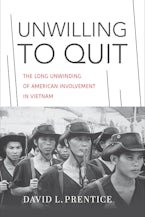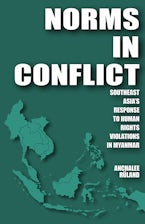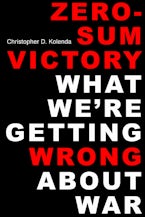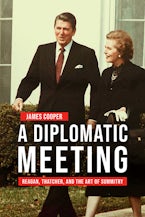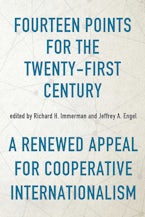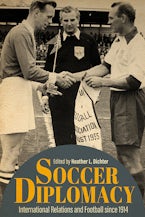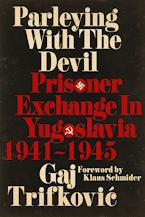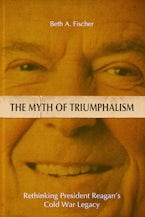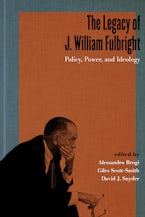In this imaginatively conceived, deeply informed, and vividly written book, Chapman brings out the many intricate linkages between the struggles for decolonization and the rivalries of the Cold War. Stunning in its scope and novelistic in its pacing, Remaking the World shows how each of these global dramas shaped, complicated, and tragically prolonged the other, bequeathing a perilously unjust international order. Scholarly and general readers alike will be enriched by this wise and bracing account.
~Salim Yaqub, author of Imperfect Strangers: Americans, Arabs, and U.S.–Middle East Relations in the 1970s
In this significant contribution to Cold War history, Chapman deftly explores decolonization as a coherent global phenomenon, while capturing the complexity and specificity of individual national movements. With clear, persuasive writing and nuanced analysis, Remaking the World charts the collision between decolonization movements and the Cold War that shaped the twentieth century, making it an essential text for scholars and students alike.
~Vanessa Walker, author of Principles in Power: Latin America and the Politics of U.S. Human Rights Diplomacy, Amherst College
This remarkable book offers a lively historical reconstruction of decolonization and superpower competition, but also explains how these fundamental dynamics of the twentieth century shaped one another. In clear and captivating prose and with an admirable balance between global view and textured case study, Remaking the World is destined to feature on syllabi, exam reading lists, and many a bookshelf. Jessica Chapman has given us a compelling account of the world we have all inherited
~John Munro, author of The Anticolonial Front: The African American Freedom Struggle and Global Decolonisation, 1945–1960
Remaking the World is a perfect classroom book. Incisive, broad in coverage, and written in clear and accessible prose, it expertly captures the explosive intersection of the global and the local, as the geopolitical forces of the Cold War ran up against the complex dynamics of decolonization. Chapman's astute analysis is certain to benefit students and more established scholars alike.
~Scott Laderman, author of Empire in Waves: A Political History of Surfing
Remaking the World is an astonishingly well-written, lucid, and engaging synthesis of the intersection of the Cold War and decolonization and its impact in the so-called Third World. Chapman masterfully relates the agency of Asian, sub-Saharan African, and Middle Eastern actors in shaping their post-colonial national destinies without disregarding the meaningful roles assumed by the United States, the Soviet Union, and China in conditioning the history of the Global South after 1945. This is a remarkable scholarly balancing act accessible to everyone.
~Pierre Asselin, Dwight E. Stanford Chair in US Foreign Relations at San Diego State University
In this masterful new synthesis, Jessica Chapman demonstrates that the true costs of the Cold War were paid by the inhabitants of the Global South. Chapman's penetrating analysis and crisp narrative beckons us to abandon once and for all the 'triumphalist' account of that epic conflict. Comprehensive and accessible, this thought-provoking study is required reading for anyone who seeks a full understanding of how the Cold War shaped the modern world.
~John Sbardellati, author of J. Edgar Hoover Goes to the Movies: The FBI and the Origins of Hollywood's Cold War
Remaking the World: Decolonization and the Cold War artfully and accessibly distills a rich scholarly literature on the double-helix of decolonization and the Cold War. In the wake of the international, transnational, and cultural turns, scholars have rethought the notion of a Europe-centered Cold War globe backlit by a few tropical hot spots scattered here and there. Chapman helps us to see instead the holistic and lateral connections between the superpower conflict, anticolonial nationalism, and the retreat of the Columbian empires.
~Jason Parker, Texas A&M University
Jessica Chapman has written a sweeping history of the Cold War's fateful collision with the global process of decolonization in India, Egypt, the Congo, Vietnam, Angola, and Iran. Put together, these cases reveal a tangled web of misunderstandings, miscalculations, and misplaced priorities on the part of both Washington and Moscow that often carried tragic consequences for postcolonial societies as well as the superpowers themselves.
~Paul Thomas Chamberlin, author of The Cold War's Killing Fields: Rethinking the Long Peace
Remaking the World is an astonishingly well-written, lucid, and engaging synthesis of the intersection of the Cold War and decolonization and its impact in the so-called Third World. Chapman masterfully relates the agency of Asian, sub-Saharan African, and Middle Eastern actors in shaping their postcolonial national destinies without disregarding the meaningful roles assumed by the United States, the Soviet Union, and China in conditioning the history of the Global South after 1945. This is a remarkable scholarly balancing act accessible to everyone.
~Pierre Asselin, Dwight E. Stanford Chair in US Foreign Relations at San Diego State University


